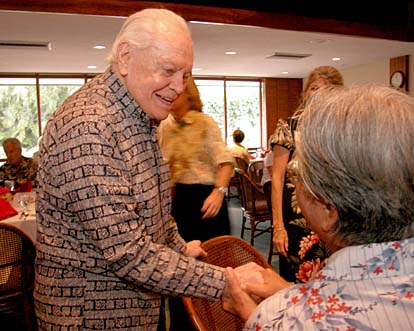

|
TheBuzz Erika Engle |
Heftel bemoans
broadcast consolidation,
citing corruptionRAMPANT media consolidation can be blamed on mogul Rupert Murdoch and all his influence-buying money, according to Cecil Heftel, former U.S. representative and broadcaster.
The theme of his speech to the Honolulu Community-Media Council yesterday was "How money bought broadcasting in America."
He believes, but can't prove, that Murdoch's money purchased the political muscle that pushed aside regulation, making way for the births of broadcast behemoths.
CRAIG T. KOJIMA / CKOJIMA@STARBULLETIN.COM
Cecil Heftel greeted Lois Tyler yesterday before addressing the Honolulu Community-Media Council on "How money bought broadcasting in America." Heftel blamed corporate behemoths for pushing deregulation of broadcasting, leading to heavy consolidation.
Waves of change
Heftel bought a Utah radio station in 1952 and built a broadcast company that eventually traded on Wall Street.Over the years, he saw waves of deregulation erode the industry's commitment to the public it is licensed to serve.
There was a time when a single company could own no more than seven AM, seven FM and seven TV stations across the country. Congress' Telecommunications Act of 1996 enabled companies to own as many as seven AM and FM stations in a single market the size of Honolulu. Four Honolulu TV stations are owned by two companies. Networks are allowed to own stations that collectively reach up to 35 percent of the national TV audience. There is a move to increase that to 45 percent.
"The corporate giants figured out how to engineer change," to ownership restrictions, he said. Money flowed into campaign war chests and votes increasingly favored broadcast deregulation.
"They couldn't buy me," he said.
Public interest lacking
Heftel said he is closely watching campaign finance reform bills moving through the state Legislature.Federal law requires broadcast licensees to operate in the interests of their communities of license, but, "Nobody even knows what the public interest is, anymore," he bemoaned. "The idea of local ownership doesn't exist anymore, and can't in the future."
Some 80 percent of America's broadcast outlets are owned by a few huge companies, such as the one that owns 1,200 radio stations, he said. It was a reference to Texas-based Clear Channel Communications Inc., which owns seven Honolulu stations, including KSSK-AM 590/FM 92.3. They were once the flagship stations of Heftel Broadcasting Corp.
In the interest of full disclosure, your columnist was a Heftel Broadcasting employee until 1990 when the stations were sold. Heftel had earlier sold KGMB-TV to avoid conflicts of interest after his election to Congress in 1976.
After Heftel's address, media council member Alf Pratte wistfully expressed regret for having participated in efforts to force Heftel to sell.
Selling his Hawaii broadcast properties was the most foolish thing he'd ever done, Heftel said.
Having had the foresight to buy Hispanic stations in Los Angeles in the 1980s before Hispanic was cool, Heftel didn't see the tsunami of media consolidation coming. He couldn't imagine that "Congress would be stupid enough to let that happen." No broadcast media covered the Heftel speech.
See the Columnists section for some past articles.
Erika Engle is a reporter with the Star-Bulletin. Call 529-4302, fax 529-4750 or write to Erika Engle, Honolulu Star-Bulletin, 500 Ala Moana Blvd., No. 7-210, Honolulu, HI 96813. She can also be reached at: eengle@starbulletin.com
